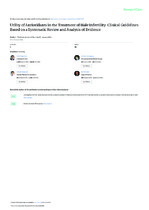| dc.description.abstract | It is widely accepted that oxidative stress plays an important role in the pathophysiology of male infertility and that antioxidants could have a significant role in the treatment of male infertility. The main objectives of this study are: 1) to systematically review the current evidence for the utility of antioxidants in the treatment of male infertility; and 2) propose evidence-based clinical guidelines for the use of antioxidants in the treatment of male infertility. A systematic review of the available clinical evidence was performed, with articles published on Scopus being manually screened. Data extracted included the type of antioxidant used, the clinical conditions under investigation, the evaluation of semen parameters and reproductive outcomes. The adherence to the Cambridge Quality Checklist, Cochrane Risk of Bias for randomized controlled trials (RCTs), CONSORT guidelines and JADAD score were analyzed for each included study. Further, we provided a Strength Weakness Opportunity Threat (SWOT) analysis to analyze the current and future value of antioxidants in male infertility. Of the 1,978 articles identified, 97 articles were included in the study. Of these, 52 (53.6%) were uncontrolled (open label), 12 (12.4%) unblinded RCTs, and 33 (34.0%) blinded RCTs, whereas 44 (45.4%) articles tested individual antioxidants, 31 (32.0%) a combination of several products in variable dosages, and 22 (22.6%) registered antioxidant products. Based on the published evidence, we 1) critically examined the necessity of additional double-blind, randomized, placebo-controlled trials, and 2) proposed updated evidence-based clinical guidelines for antioxidant therapy in male infertility. The current systematic review on antioxidants and male infertility clearly shows that antioxidant supplementation improves semen parameters. In addition, it provides the indications for antioxidant treatment in specific clinical conditions, including varicocele, unexplained and idiopathic male infertility, as well as in cases of altered semen quality. | en_US |

